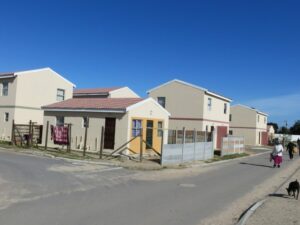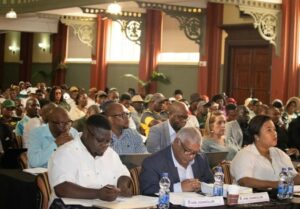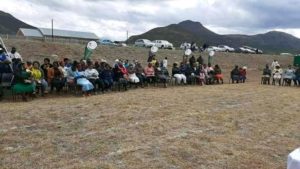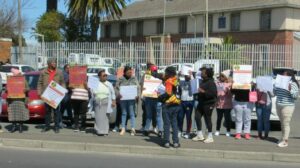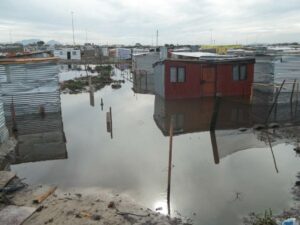The community of Riverlands, a small village between Atlantis and Malmesbury in the Western Cape, is still reeling from the loss of their homes, livelihoods and damaged infrastructure due to a flood resulting from the rupture of three dams on the Dassenberg Farm during heavy rains last month.
On Thursday last week, in a show of the grand alliance between the African National Congress and the Democratic Alliance, the Department of Water and Sanitation (DWS) together with the MEC for local government and the mayor of Swartland Municipality, presented a preliminary report to the media and members of the community.
Minister Majodina presented the report to the media and the community last week Thursday.
The dams, according to the report, had no sufficient spillways which caused them to break as it was raining heavily. The report puts the blame at the door of the current owner, the national Department of Agriculture, Land Reform and Rural Development (DALRRD), and the previous owners.
Presented by DWS Minister Pemmy Majodina, the report states that the dams were built without permits and are therefore unlicenced. Three of the four dams were built in the 1960s by the then owner of Dassenberg Farm. The fourth dam, was built by Agrico Machinery when the farm was sold to them in 2000. The report states that Agrico Machinery constructed the dam without a licence.
The then Department of Rural Development and Land Reform bought the farm in 2019 and leased to a co-operative without doing due diligence of checking that the dams were licenced. The Mazibuyinkomo Primary Agricultural Co-operative have a 30-year lease agreement with the merged departments of agriculture and land reform, DALRRD.
According to the report, the floods affected hundreds of people, leaving some homeless, and causing severe damage to infrastructure, including roads, railway lines, and Eskom’s transmission network. Water infrastructure was damaged and the community now relies on water trucks. The minister announced that the DWS would, together with the Swartland Municipality, determine the extent of the damage caused by the failure of the dams.
Wynona McGregor, a subsistence crop and livestock farmer told Elitsha that she is still traumatised from the experience of shouting for help while clinging to trees and fences as the current grew stronger and stronger, without anyone responding. Wynona said she was woken up by a gale force wind that was threatening to blow her roof away. Following a thundering sound, she looked out of the window and all she could see was water.
What now looks like a river was once a road. Wynona and others now stay at the community centre as they wait for assistance from government to rebuild their lives.
Part of Wynona’s vegetable garden is now a wide ditch.
Another subsistence farmer, not far from Wynona, told Elitsha that he lost his home and some of his livestock. Jim Foster also stays at the community centre as the water eroded the foundation of his house and caused it to collapse
Foster’s house now hangs by two pillars but the whole foundation is gone.
Another resident, Donovan Manuel, who ekes out a living from cutting and selling wood, said his machinery was washed away by the floods and some of it is now damaged. What used to be Donovan’s house now lies at the edge of the river that was created by the flood.
Ralph Burger, a community leader, said that the floods also damaged the rugby field. The local rugby team, competing in the top league in the region, now does not have a field to train on.
Mayor of Swartland Municipality, Harold Cleophas, said that they estimate the cost of damages to be around R50-million and are prepared to help the community to file a class action lawsuit against those responsible for the loss.
